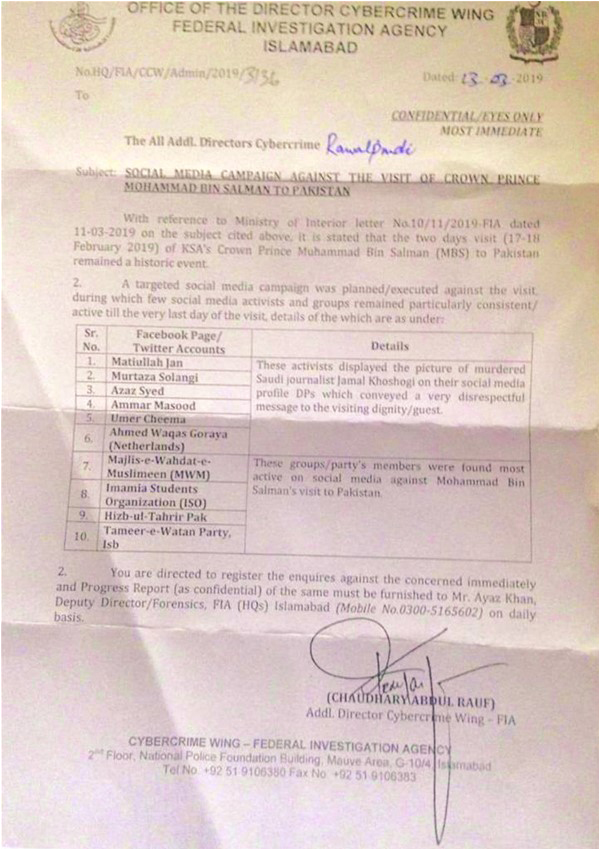
The recent directions to the Federal Investigation Agency (FIA) to inquire into “social media campaign” during Crown Prince Mohammad Bin Salman’s visit to Pakistan in February has ignited debate on how the Prevention of Electronic Crimes Act 2016 is being used to stifle dissent and freedom of expression.
The directions to FIA were contained in a letter by the Interior Ministry headed by Prime Minister Imran Khan himself. “A targeted social media campaign was planned and executed” during the visit of the crown prince, the document said, naming some half a dozen journalists who were allegedly involved. “These activists displayed the pictures of murdered Saudi journalist Jamal Khashoggi on their social media profiles,” it said. “Inquiries should be held and a report submitted daily.”
This is not the first incident of its kind to demonstrate misuse of the cybercrime laws by the state.

Sometime ago, a newspaper reporter in Balochistan was arrested under this law and jailed. When the Senate Information Committee asked what specific charges had been brought against him, the FIA initially dilly dallied. Finally, it transpired that the journalist was jailed on the basis of a letter by an officer of Frontier Corps, alleging “controversial and demoralising statements” posted on the journalist’s Facebook. These “created hype and havoc in the society at large” and put “the lives of officers of the agencies in danger,” the letter said quoting only an unnamed “source report.”
On the basis of this letter, the FIA concluded “the matter falls under Section 20 of PECA Act 2016 for defaming/demoralising the state.” A case “State through FIA” was registered, the journalist arrested and a six-day remand obtained from a magistrate.
Committee members were bewildered that the complainant “State through FIA” was not a natural person (as provided in the law) whose reputation was allegedly harmed. They also noted that while the law required “only an authorised officer of the investigation agency shall have the powers to investigate an offence under this Act,” the FIA had acted merely on the command of the FC officer without making any investigations. The post on Facebook by the journalist which angered the FC was about protection money mines owners paid to the law enforcement agency.
The case being in court and the journalist already bailed, no further comments are warranted. Nonetheless, these incidents show how the cybercrime law is misused by the state to stifle dissent.
A major reason for the law’s misuse is the non-implementation of some of its critical sections.
For instance, Section 53 requires the FIA to “submit a half yearly report to both Houses of the Parliament for consideration by the relevant Committee in camera, in respect of its activities.” It was incorporated after a great deal of discussion when lawmakers insisted on minimum measures to hold the investigating agency accountable. An element of parliamentary oversight was provided to protect citizens from the law’s abuse. To give due protection to the investigation agency, it was decided that disclosures before Parliament will be in-camera.
The investigation agency, however, has been hesitant to place reports before the parliament. It was agitated in the Senate which resulted in a comprehensive ruling by the chairman in 2017, laying down the procedure for submission of bi-annual reports and directions to the government to make rules in this regard. That landmark ruling, it appears, has been totally ignored.
By not placing before the parliament periodic reports even for in-camera discussion, there is no transparency in the operations of the investigation agency. No one knows how whimsically the law has been applied to stifle dissent and free discussion.
Similarly, Section 40 of the law states: “The Federal Government shall establish or designate a forensic laboratory, independent of the investigation agency, to provide expert opinion before the court or for the benefit of the investigation agency.” But this has not been done and the investigating agency also acts as forensic laboratory.
Section 44-1 of the law states: “The Federal Government, in consultation with the Chief Justice of respective High Court, shall designate presiding officers of the Courts to try offences under this Act at such places as deemed necessary.” Section 44-2 states: “The Federal Government shall, in consultation with the Chief Justice of respective High Court, arrange for special training of the presiding officers of the Court to be conducted by an entity notified by the Federal Government for training on computer sciences, cyber forensics, electronic transactions and data protection.” None of this has been done during the past three years.
The parliament can only make a law but cannot implement it. A 2013 legislation forbade resurrection of banned outfits but militants still strut around freely. Likewise, Section 53 of the cybercrime law also continues to be flouted. It is common to blame members of the parliament, not that they are above criticism or that the cybercrime law is free of grave shortcomings. The Senate Committee made more than 50 changes in the original cybercrime law to blunt its weaponisation.
With the state’s growing intolerance towards dissent, failure to implement critical sections could gravely endanger citizens’ freedoms. Some social media activists have mysteriously disappeared while many others have been booked on the most frivolous grounds.
Security agencies merely quoting “source reports” alleging that a social media post had created “hype and havoc in society” and jailing activists on its basis is pregnant with disastrous consequences for freedom of expression. A rigorous parliamentary scrutiny of the cybercrime law, its implementation during the past three years and accountability of the investigation agency are urgently needed.
The writer was co-opted on Senate Committee on Information Technology
The directions to FIA were contained in a letter by the Interior Ministry headed by Prime Minister Imran Khan himself. “A targeted social media campaign was planned and executed” during the visit of the crown prince, the document said, naming some half a dozen journalists who were allegedly involved. “These activists displayed the pictures of murdered Saudi journalist Jamal Khashoggi on their social media profiles,” it said. “Inquiries should be held and a report submitted daily.”
This is not the first incident of its kind to demonstrate misuse of the cybercrime laws by the state.

Sometime ago, a newspaper reporter in Balochistan was arrested under this law and jailed. When the Senate Information Committee asked what specific charges had been brought against him, the FIA initially dilly dallied. Finally, it transpired that the journalist was jailed on the basis of a letter by an officer of Frontier Corps, alleging “controversial and demoralising statements” posted on the journalist’s Facebook. These “created hype and havoc in the society at large” and put “the lives of officers of the agencies in danger,” the letter said quoting only an unnamed “source report.”
On the basis of this letter, the FIA concluded “the matter falls under Section 20 of PECA Act 2016 for defaming/demoralising the state.” A case “State through FIA” was registered, the journalist arrested and a six-day remand obtained from a magistrate.
Committee members were bewildered that the complainant “State through FIA” was not a natural person (as provided in the law) whose reputation was allegedly harmed. They also noted that while the law required “only an authorised officer of the investigation agency shall have the powers to investigate an offence under this Act,” the FIA had acted merely on the command of the FC officer without making any investigations. The post on Facebook by the journalist which angered the FC was about protection money mines owners paid to the law enforcement agency.
The parliament can only make a law but cannot implement it. A 2013 legislation forbade resurrection of banned outfits but militants still strut around freely
The case being in court and the journalist already bailed, no further comments are warranted. Nonetheless, these incidents show how the cybercrime law is misused by the state to stifle dissent.
A major reason for the law’s misuse is the non-implementation of some of its critical sections.
For instance, Section 53 requires the FIA to “submit a half yearly report to both Houses of the Parliament for consideration by the relevant Committee in camera, in respect of its activities.” It was incorporated after a great deal of discussion when lawmakers insisted on minimum measures to hold the investigating agency accountable. An element of parliamentary oversight was provided to protect citizens from the law’s abuse. To give due protection to the investigation agency, it was decided that disclosures before Parliament will be in-camera.
The investigation agency, however, has been hesitant to place reports before the parliament. It was agitated in the Senate which resulted in a comprehensive ruling by the chairman in 2017, laying down the procedure for submission of bi-annual reports and directions to the government to make rules in this regard. That landmark ruling, it appears, has been totally ignored.
By not placing before the parliament periodic reports even for in-camera discussion, there is no transparency in the operations of the investigation agency. No one knows how whimsically the law has been applied to stifle dissent and free discussion.
Similarly, Section 40 of the law states: “The Federal Government shall establish or designate a forensic laboratory, independent of the investigation agency, to provide expert opinion before the court or for the benefit of the investigation agency.” But this has not been done and the investigating agency also acts as forensic laboratory.
Section 44-1 of the law states: “The Federal Government, in consultation with the Chief Justice of respective High Court, shall designate presiding officers of the Courts to try offences under this Act at such places as deemed necessary.” Section 44-2 states: “The Federal Government shall, in consultation with the Chief Justice of respective High Court, arrange for special training of the presiding officers of the Court to be conducted by an entity notified by the Federal Government for training on computer sciences, cyber forensics, electronic transactions and data protection.” None of this has been done during the past three years.
The parliament can only make a law but cannot implement it. A 2013 legislation forbade resurrection of banned outfits but militants still strut around freely. Likewise, Section 53 of the cybercrime law also continues to be flouted. It is common to blame members of the parliament, not that they are above criticism or that the cybercrime law is free of grave shortcomings. The Senate Committee made more than 50 changes in the original cybercrime law to blunt its weaponisation.
With the state’s growing intolerance towards dissent, failure to implement critical sections could gravely endanger citizens’ freedoms. Some social media activists have mysteriously disappeared while many others have been booked on the most frivolous grounds.
Security agencies merely quoting “source reports” alleging that a social media post had created “hype and havoc in society” and jailing activists on its basis is pregnant with disastrous consequences for freedom of expression. A rigorous parliamentary scrutiny of the cybercrime law, its implementation during the past three years and accountability of the investigation agency are urgently needed.
The writer was co-opted on Senate Committee on Information Technology

